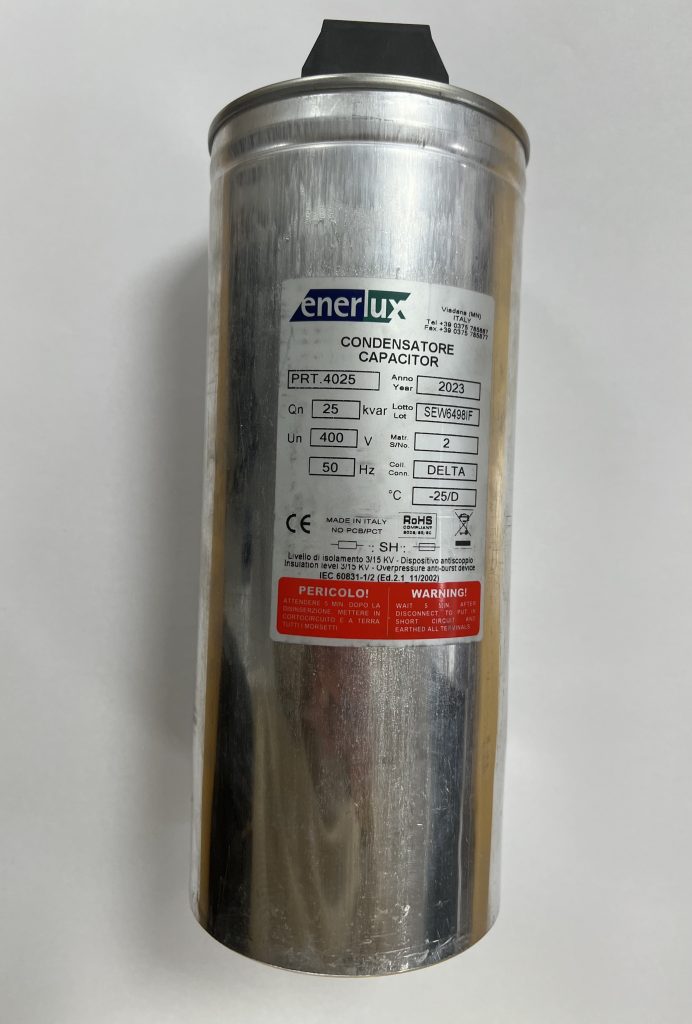What is a UPS Capacitor?
UPS capacitors are components responsible for storing and releasing electrical energy when needed. Capacitors help smooth out voltage fluctuations, filter the output power, and provide a short burst of energy during power interruptions. A UPS (Uninterruptible Power Supply) capacitor is a crucial component within a UPS system that plays a key role in ensuring the reliable and uninterrupted supply of power to connected devices, especially during brief power interruptions or fluctuations. Here's an overview of the UPS capacitor and its function:
Function:
- The primary function of a UPS capacitor is to store and release electrical energy quickly.
- Capacitors are used to provide a short burst of power during transient events, such as sudden voltage drops or spikes, to stabilise the output voltage.
Power Conditioning:
- Capacitors contribute to power conditioning within a UPS system, helping to smooth out fluctuations in the incoming electrical supply.
- They can absorb and discharge electrical energy rapidly, preventing sudden voltage changes from affecting the connected equipment.
Backup Power Delivery:
- In the event of a power outage, the stored energy in capacitors can be used to provide a temporary and immediate power source until the UPS system switches to its secondary power source, typically batteries or a generator.
Bridge Power Gaps:
- Capacitors act as a bridge during the transition between the loss of main power and the activation of the backup power source. This ensures a seamless and uninterrupted power supply to critical devices.
Voltage Regulation:
- Capacitors assist in maintaining a stable and regulated output voltage, especially when there are minor fluctuations or disturbances in the incoming power.
The Lifespan of a UPS Capacitor
There is not set lifespan on UPS capacitors, the component undergoes a lot of usage and pressure therefor it is known capacitors are the UPS components most prone to failure alongside UPS systems batteries.
Lifecycle Considerations:
- Capacitors, like other electronic components, have a finite lifespan. Regular maintenance and periodic checks are essential to ensure the capacitors are functioning correctly.
- Over time, capacitors may degrade, and their ability to store and release energy may diminish. Therefore, they may need replacement as part of UPS system maintenance.
When Do We Change Your Capacitor?
UPS capacitors are always changed in a UPS unit overhaul. During maintenance and scheduled repairs that your UPS unit undergoes, our engineers check the capacitors. Here is a list of what our engineers are checking when determining if the capacitors need replacing:
Age: Capacitors, like any electronic component, have a finite lifespan. Over time, they can degrade due to factors such as heat and electrical stress. As a general rule, capacitors in a UPS system may need replacement after several years of continuous operation. Manufacturers often provide guidelines on the expected lifespan of their UPS components.
Visual Inspection: Physically inspecting the capacitors for signs of bulging, leaking, or other visible damage is important. If you notice any abnormalities, it could indicate that the capacitors are failing and need replacement.
Voltage Issues: If the UPS system experiences frequent voltage spikes or fluctuations, it can contribute to the wear and tear of capacitors. Unstable voltage levels can cause stress on the capacitors and reduce their effectiveness over time.
Failure to Hold a Charge: Capacitors should be able to hold and discharge energy as needed. If you notice that the UPS is not functioning as expected during power outages, or if it fails to hold a charge, it may indicate capacitor issues.
Diagnostic Alerts: Modern UPS systems often come with diagnostic capabilities that can alert users to potential issues, including problems with capacitors. Pay attention to any warning messages or alarms generated by the UPS.
Regular Maintenance Schedule: Incorporating regular maintenance checks into the UPS system's schedule is advisable. During these checks, technicians can assess the condition of capacitors and other critical components.
Manufacturer Recommendations: Follow the manufacturer's guidelines and recommendations for capacitor replacement. Manufacturers often provide information on the expected lifespan of their components and when preventive replacement is advisable.
The Dangers of Damaged Capacitors
If your UPS capacitors are faulty, you are a large risk to a series of unwanted threats. If you suspect your capacitor is faulty you will need to contact us urgently, our engineers are trained experts on all manufactures of UPS systems.
Power Supply Instability: Faulty capacitors can lead to power supply instability. Capacitors play a crucial role in smoothing out voltage fluctuations and providing a stable electrical output. When capacitors fail, the UPS system may struggle to regulate voltage effectively, leading to erratic power supply.
Risk of Overheating: Capacitors that are damaged or malfunctioning can generate excess heat. Overheating poses a risk to the overall health of the UPS system and may lead to a cascade of failures in other components.
Increased Electrical Noise: Faulty capacitors may contribute to increased electrical noise in the power output. This can result in interference with sensitive electronic equipment, potentially leading to malfunctions or data corruption.
Reduced Energy Storage: Capacitors store energy to provide a short burst of power during outages. If capacitors are faulty, they may lose their ability to store and discharge energy effectively, reducing the UPS system's ability to provide backup power.
Potential for Explosive Failure: In extreme cases, faulty capacitors can experience a catastrophic failure known as a "capacitor explosion." This occurs when a capacitor fails and releases its stored energy rapidly. While modern capacitors are designed with safety features to minimise this risk, it can still pose a danger to nearby components and individuals.
Damage to Connected Devices: Unstable power supply from a UPS with faulty capacitors may damage connected electronic devices. Sudden voltage spikes or drops can harm sensitive equipment, leading to data loss, hardware damage, or other operational issues.
Fire Hazard: Although rare, a severe capacitor failure combined with other factors could potentially result in a fire hazard. Capacitor failures that involve thermal runaway or other catastrophic events may release smoke or flames.
System Shutdown or Malfunction: A UPS system with faulty capacitors may experience unexpected shutdowns or malfunctions, defeating the purpose of having a reliable backup power source.











